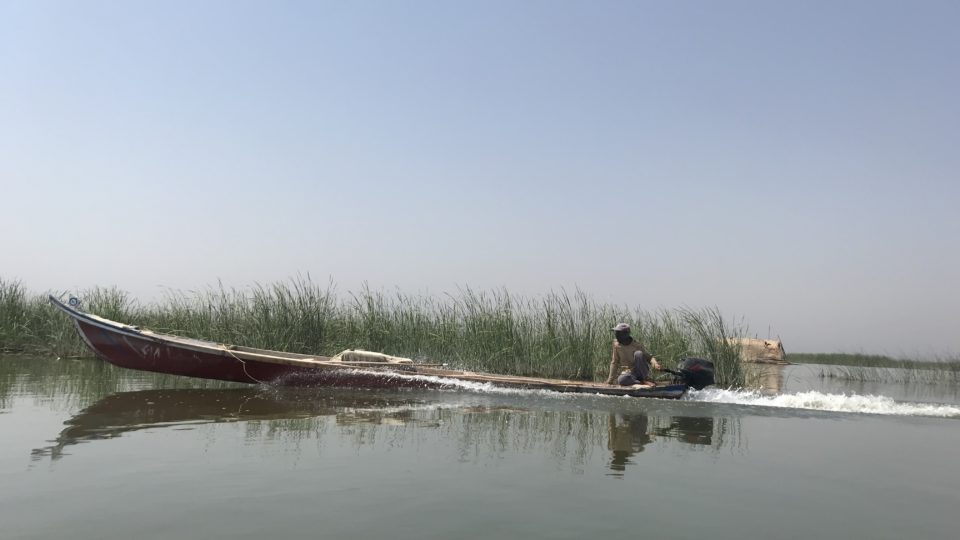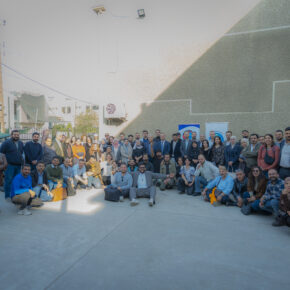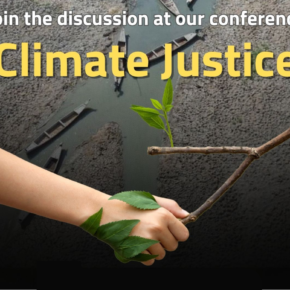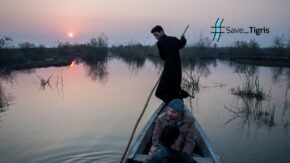Letter From Save the Tigris to the UNESCO World Heritage Centre: Concerns and Requests regarding the Ahwar of Iraq
In 2016 the Iraqi Marshes were inscribed in the UNESCO World Heritage List as part of the Ahwar. Each year, the UNESCO World Heritage Committee reviews reports on the state of conservation of the property and follows up with the State Party of Iraq in case it is not properly managed. Iraq’s 2020 State of Conservation Report was submitted on 28 January 2020 by the Permanent Delegation of Iraq to UNESCO. This letter constitutes specific comments on the report from Save the Tigris Campaign, prior to the 2020 meeting of the UNESCO World Heritage Committee.
18 March 2020
From: Save the Tigris Campaign
To: UNESCO World Heritage Centre
Re: The Ahwar of Iraq 2020 State of Conservation Report by the State Party of Iraq – Civil society concerns and requests
We write as a coalition of civil society organisations from nine countries concerned with the protection of the Ahwar of Southern Iraq. We would like to express our concerns to the World Heritage Center over the State Party of Iraq’s response to Decision 43COM7B.35 of The World Heritage Committee.
UNESCO recognizes that guaranteed water flows and water allocations for the natural component of the site continue to be a challenge. Iraq is increasingly at the risk of climate-fragility. In 2018 the Ahwar suffered from water scarcity as Iraq experienced an arid summer due to lower rainfalls, high temperature and high evaporation rates. In 2019, the country experienced heavy rainfall and floods as a consequence of increased precipitation. The on-going construction of Turkish and Iranian dams and projects on the Tigris River shared with Iraq, are exacerbating these erratic extremes in the basin’s water regime and mostly affect Southern Iraq including the Iraqi Marshes. The reservoir of Ilisu Dam, Turkey’s large hydropower structure on the Tigris River, is currently being filled. The marshland communities are particularly vulnerable to these developments. Cumulative changes in the environment and water supplies of the Marshes exposes the population of the Marshes to increasing vulnerability and they often lack resilience to the unpredictable climate. The local aquatic system of the Marshes can no longer guarantee adequate food, water quantity or quality for livestock and the local population struggles with the fragility of the environment. To increase their resilience, Marsh populations will need livelihood support. Climate adaptation and mitigation policies are lacking, while the impacts of upstream dam construction have not been successfully addressed by the State Party of Iraq.
Save the Tigris Campaign would like to ask the World Heritage Centre (WHC) to:
- Request the State Party of Iraq to demonstrate measurements taken to ensure sustainable water flows to the Ahwar for the next years;
- Request the State Party of Iraq to undertake a Strategic Environmental Assessment of existing and proposed dams on the Tigris-Euphrates Rivers and their tributaries, with a specific mandate of assessing future impact on flows to the Ahwar:
- Request the State Party of Turkey to explicitly incorporate the minimum required flows for the Ahwar in the regulation of dams on rivers that feed the property, in order to preserve the OUV of the Ahwar.
- Request the State Party of Iraq to submit data on an annual basis to assess which species are most affected by overhunting each year. This could be done with the support of IUCN.
- Emphasize specifically the link between tourism livelihood and the preservation of traditional ecological knowledge in the Ahwar;
- Request the State Party of Iraq to clarify its intentions regarding oil development within or in the vicinity of the site, and clarify whether oil developments could jeopardize the World Heritage designation of the Ahwar;
- Request the State Party to take adequate steps to disclose information regarding concerns and measurements for the property and involve independent civil society in the process of the site management and protection.
Our specific comments on Iraq’s 2020 State of Conservation Report as submitted on 28 January 2020 by the Permanent Delegation of Iraq to UNESCO, are as follows:
1. Minimum water flows
The World Heritage Committee reiterates its request that the State Party of Iraq “provides the natural components of the property with adequate water within its national capacity as a matter of utmost priority”. According to data of the Iraqi Government, in 2017 and 2018, the minimum water flows needed to sustain the Iraqi Marshes were not met, while in 2019, the water inflow for the Marshes was 112% higher than the minimum amount required. The State of Conservation Report does not mention any outlook for the next year(s) or demonstrated measurements to ensure sustainable flows to the Marshes in the future, even though in the earlier 2018 Decision 42COM7B.66 the WHC requested the State Party of Iraq to “demonstrate that these water flows are being provided.”
The State of Conservation Report attributes the lack water flows from 2017-18 to climate change and decreased water flows upstream. These issues did not end in 2019. Rather, climate change asserted itself in 2019 as climate stress becomes increasingly common, while upstream neighbours continue to build water infrastructure heedless of the impacts these projects are having. In 2019, Iraq had not seen as much precipitation since 1988, according to the Iraqi Ministry of Water Resources. Climate change becomes increasingly unpredictable and may lead to both droughts and floods as we move towards extreme weather phenomena. Climate adaptation should be part of the Ahwar management policies. In addition, the inflow of rivers originating from outside of Iraq will continue to decrease within the next decade. It is a positive development that in 2019 buffalo breeders have returned to the Ahwar and biodiversity flourished, but the challenge will be to maintain such stability. This requires a long-term strategy.
2. Long-term water-sharing agreements
The WHC in its decision encourages efforts of the State Parties of Iraq, Iran and Turkey “to ensure the provision of adequate amounts of water for the Ahwar.” However, the water strategy of Iraq remains incoherent. The Strategy for Water and Land Resources in Iraq (SWLRI), which was adopted by the Iraqi Government, recommends “no new large dams are required to assist Iraq in achieving its 2035 objectives.” It says no further dams should be built until agreements have been reached with upstream states on downstream flows. Yet the Kurdistan Regional Government (KRG) in December 2019 announced work has resumed on 11 stalled dam projects on tributaries of the Tigris River, which will store up to 59 milion cubic meters of water. The KRG together with the Government of Iraq and Turkey have also announced in 2019 the construction of 3 new dams on the border of Iraq and Turkey. On 31 July Iraq, the KRG and Turkey agreed to form a technical team to study the Greater Zab River, where the dams will be located. The Greater Zab is a tributary of the Tigris, which feeds the Iraqi Marshes. The cumulative impact of all these dams remains yet to be seen and few if any environmental impacts studies on these projects are accessible. In its Decision 40COM7 (2016), the UNESCO World Heritage Committee says it “urges States Parties to ensure that the impacts from dams that could affect properties located upstream or downstream within the same river basin are rigorously assessed in order to avoid impacts on the Outstanding Universal Value (OUV).” The KRG has proposed that its dams could store water for Southern Iraq, which includes the Ahwar, but Erbil-Baghdad relations have a history of tension and the KRG has on previous occasions threatened to cut off water flows to Southern Iraq. This policy incoherence in Iraq’s water strategy must be addressed if the State Party of Iraq is to meet the World Heritage Committee’s requirement that the minimum flows to the Iraqi Marshes are maintained.
As for upstream dam construction in Turkey, it is an important development that negotiations have taken place on the highest level between Iraq and Turkey to agree on water shares of the Tigris and Euphrates River for Iraq, especially as the reservoir of Ilisu Dam is currently being filled. UNESCO should further encourage the ratification of the 1997 Convention on the Law of Non-Navigational Uses of International Watercourses by Turkey and Iran, and in particular the legal agreement that Iraq has proposed to Turkey. According to the State of Conservation Report, the required amount of water to sustain the marshlands will be assured through this agreement, but we would encourage to mention the Marshes specifically.
For now, we would request that the World Heritage Committee requires the State Party of Iraq and countries involved to:
- Undertake a basin-wide Strategic Environmental Assessment of existing and proposed dams on the Tigris-Euphrates Rivers and their tributaries, with a specific mandate of assessing future impact on flows to the Ahwar. The Strategic Environmental Assessment (SEA) should be conducted in compliance with IUCN Guidance for World Heritage Environmental Assessments, with opportunities for public participation, and
- Halt the design and financing of new dam projects until a SEA is available to guide such development and its conclusions are made public and reviewed by the World Heritage Center and IUCN. Once the SEA is available Environmental Impact Assessments (EIAs) for each large dam and reservoirs upstream need to fully incorporate the conclusions of the SEA and be submitted to WHC and IUCN for review.
- Request that the State Party of Turkey explicitly incorporates the minimum required flows for the Ahwar in the regulation of dams on rivers that feed the property, in order to preserve the OUV of the Ahwar.
3. Bird hunting and overfishing
The WHC has requested Iraq to submit data concerning illegal bird hunting and overfishing including the number of prosecutions and convictions from these illegal activities, and to further strengthen its legal protection, enforcement and management capacity to control these activities. UNESCO should request data from the State Party of Iraq on an annual basis, to assess which species are most affected each year. This could be done with the support of IUCN. We would like to request UNESCO to stress sensitization of local population on sustainable use of ecosystem services, and the harmful effects of illegal fishing methods and off-season hunting. This could be established through community-based hunting plans which can act as a regulatory mechanism for hunting by community groups, local fishing societies or individuals.
4. Tourism and livelihood
The State Party announces the preparation and implementation of a comprehensive tourism management plan for the Ahwar, upon the request of the WHC. The report mentions “small projects of a tourist nature were established within the natural components that contribute to the development of tourism activity in the area.” There is an intrinsic connection between the ecological health of the Marshes and the continuity of the cultural traditions of the Marsh Arabs, which is acknowledged by UNESCO since it requests the application of “traditional ecological knowledge to any planned new constructions”. We believe UNESCO should emphasize specifically the link between tourism livelihood and the preservation of traditional ecological knowledge.
Tourism livelihoods could guarantee the endurance of the traditional ecological knowledge held by the men and women of the Marsh Arab communities in view of the unstable water supplies, and it would additionally create alternative employment opportunities to reduce hunting pressure levels on fish and birds. Plans and projects should be intrinsically ecological and sustainable while creating new livelihoods for the inhabitants of the Ahwar. Communities need training in order to gain new skills for employability or to employ existing capacities. It can enable workers to found small cooperatives and lead their path to economic and personal development. Women in particular need support to maintain their traditional knowledge and to earn a living. UNESCO should encourage innovative construction solutions in tourism plans, including renewable energy and waste recycling.
5. Oil activities
The WHC urges the State Party of Iraq to commit to not conduct oil exploration or extraction inside the property. The State of Conservation Report mentions no oil activities have taken place in the vicinity of the property due to weather conditions, but offers no guarantees that this will not be the case in the future. It is important that UNESCO requests the State Party of Iraq to clarify its intentions regarding oil development within or in the vicinity of the site. Is it willing to install a moratorium on oil exploration and extraction? If not, which specific areas within or in the vicinity of the site would be subjected to such kind of activities? Additionally, UNESCO should clarify whether oil developments could jeopardize the World Heritage designation of the Ahwar.
6. Involvement of civil society and local communities
A coalition inclusive of all stakeholders including civil society and indigenous communities would be best fit to manage the sustainable development of the natural property. This requires transparency and increased collaboration from the State Party. The Higher Committee for the Implementation of the Management Plan for the Ahwar of Southern Iraq as a World Heritage Property has not released any of its findings to the press. The WHC should request the State Party to take adequate steps to disclose information regarding concerns and measurements for the property and involve independent civil society in the process of the site management and protection.
Sincerely,
Save the Tigris Campaign
www.savethetigris.org





